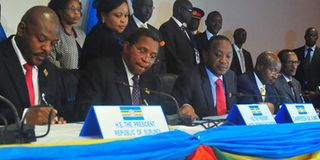Regional traders to benefit from quick money transfer

L-R: Presidents Nkurunziza, Kikwete , Kenyatta, Museveni and Kagame sign a document at the recent EAC heads of state summit in Kampala. PHOTO by STEPHEN WANDERA
What you need to know:
Figures from the Central Bank of Kenya show that transactions between January and October this year on RTGS system totalled $220.6 billion which is Ksh1.097 trillion short of the Ksh19.87 trillion ($231.08 billion) transacted in 2012.
Kampala- Ugandan traders will be able to transfer money across borders in the East African region within a day thanks to a new initiative that has inter-linked the region’s central banks.
The initiative which is part of the projects by the East African Community member states to grow their capital markets has taken effect in Uganda, Kenya and Tanzania while Rwanda and Burundi are expected to join later.
The East African Cross Border Payment System (EAPS) will use the Real Time Gross Settlement system (RTGS), which has been operational since 2005 where settlements are made immediately unlike the previous two to three days taken to receive the money previously.
“The EAPS connects the Real Time Gross Settlement system of a country in the East Africa states from the single system to that of a multi-currency system,” Ms Joyce Okello, Bank of Uganda director of payments and settlements, said yesterday during an interview.
Money transfer simplified
The system is expected to ease money transfers within the region, where regional trade volumes are growing.
Unlike the previous system that involved using a third party correspondent bank, the new system allows someone to walk into any commercial bank in the region, and ask to transfer money across the border. But there must be a currency conversion first.
“You can approach any commercial bank in the region and buy whatever currency you want to send. Then your banker will transfer it,” Ms Okello said.
“If bank A is making a payment on behalf of a Ugandan trader to a firm in Nairobi, the customer is required to send the money to bank B with which they have agreed, which will in turn reroute the money to a Kenyan bank. Then Bank B will send the money to the recipient bank,” Ms Okello explained.
The bonus about it is that the charges incurred while using the correspondent third party to transfer money will be eliminated.
Asked whether there are any risks involved in the system, she said plans are underway to install a monitoring system.
According to the World Bank report of Doing Business in the East Africa Community, export time reduced to 28 days in 2012 from 40 days in 2006. Import time, however, was cut nearly in half from 59 days in 2006 to 33 days in 2012.
A Bank of Uganda report shows that by end of 2011/12, United the RTGS system also known as Inter-Bank Settlement (UNISS), had 25 participants comprising of 23 commercial banks, one non-Bank Financial Institution (Post Bank Uganda Limited) and Bank of Uganda.
In 2011/2012, the overall RTGS transaction volume was more than 476,000 with a value of more than Shs153 trillion. In the month of June 2011, RTGS transactions totaled 37,532 valued at Shs10.8 trillion. This figure has since grown by 6.3 per cent to 39,879 transactions valued at Shs13.1 trillion, an increase of 21 per cent in June 2012.
Figures from the Central Bank of Kenya show that transactions between January and October this year on RTGS system totalled $220.6 billion which is Ksh1.097 trillion short of the Ksh19.87 trillion ($231.08 billion) transacted in 2012.




